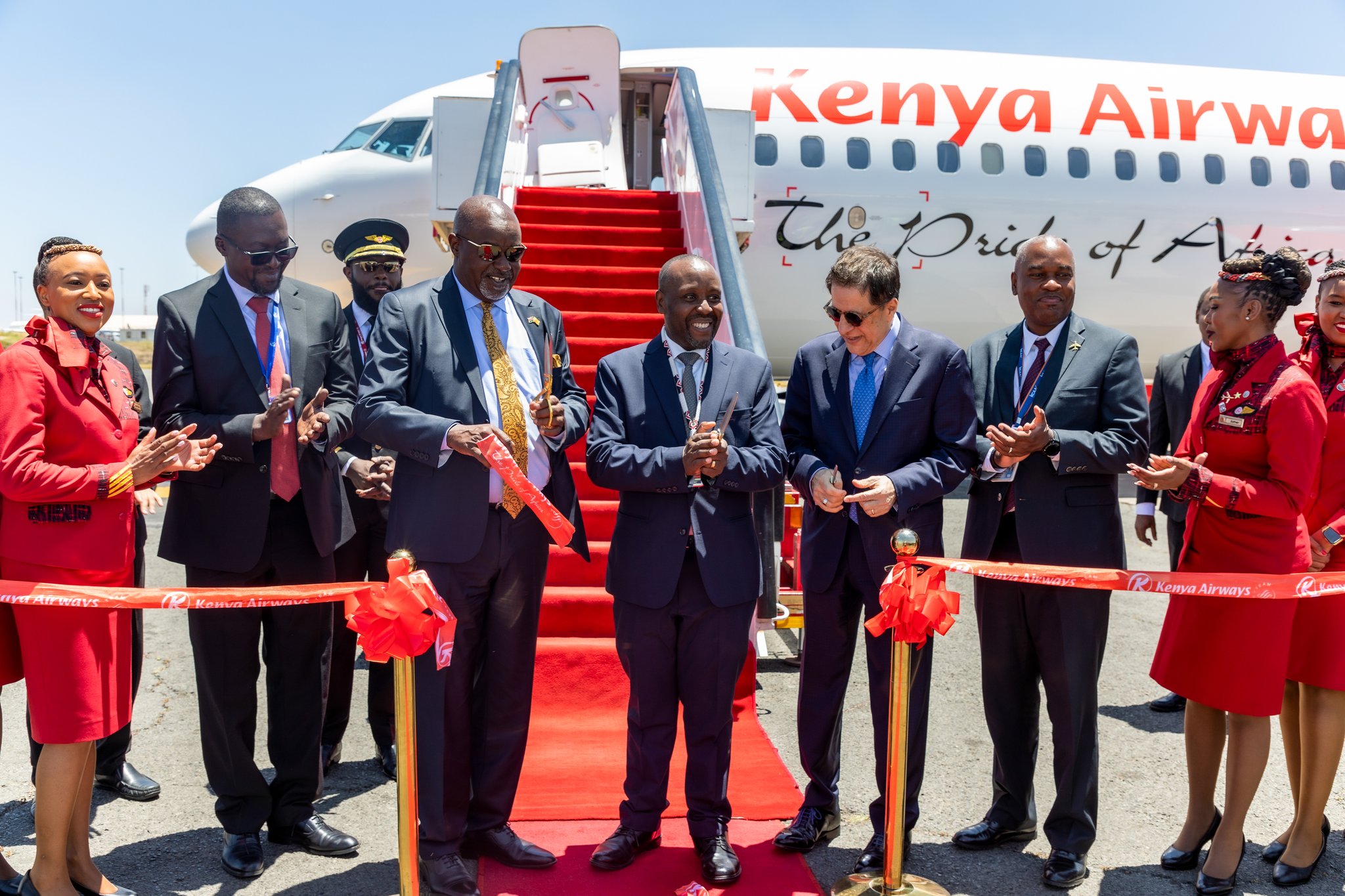KLM Royal Dutch Airlines and Kenya Airways (KQ) today convened a high-level executive roundtable in Nairobi, culminating in a landmark policy breakthrough aimed at accelerating the adoption of alternative aviation fuel (SAF) across Africa.
For the first time, key aviation stakeholders reached consensus on a comprehensive set of regulatory recommendations, including SAF blending mandates, producer incentives, and streamlined certification processes, marking a pivotal step toward unlocking the continent’s untapped potential to minimize aviation’s environmental impact.
The event brought together 20 senior stakeholders, including leadership from the International Civil Aviation Organization (ICAO), Kenya Civil Aviation Authority (KCAA), Kenya Airports Authority (KAA), the African Airlines Association (AFRAA), and the International Air Transport Association (IATA).
The roundtable was convened at a critical juncture for the aviation industry, which currently accounts for approximately 2–3% of global CO₂ emissions, but is expected to grow significantly, particularly in emerging markets such as Africa. With Africa’s passenger traffic projected to double by 2035, according to IATA, sustainable pathways for growth have become an urgent imperative.
Participants focused their deliberations on addressing the twin challenges of policy frameworks and infrastructure necessary to enable a scaled uptake of SAF in Africa.
Alternative aviation fuel, derived from renewable sources such as waste oils, agricultural residues, and other sustainable biomass, offers the potential to reduce lifecycle carbon emissions by up to 65% compared with traditional jet fuel. However, despite global momentum, Africa remains at an early stage of its adoption due to logistical, regulatory, and economic barriers.
The roundtable discussions emphasized the critical role of coordinated regulatory action to foster an enabling environment for SAF investment and production. Industry experts highlighted that Africa’s abundant biomass resources, particularly in East and Southern Africa, offer a significant untapped opportunity for sustainable feedstock cultivation. However, without harmonised policies across nations and clear incentives for SAF producers and airlines, scaling production remains constrained.
One of the key outcomes of the meeting was the development and agreement on a comprehensive policy recommendation package aimed at harmonising regulatory approaches across African jurisdictions. This package advocates for the establishment of SAF blending mandates, incentives such as tax breaks or subsidies for SAF producers, and streamlined certification processes to facilitate market entry. The recommendations also call for enhanced collaboration between aviation authorities, government agencies, and private sector stakeholders to accelerate infrastructure investments, including SAF storage and blending facilities at major African airports.
Furthermore, the roundtable agreed on the formulation of a joint SAF action roadmap to guide coordinated efforts in the region. This roadmap is designed to be a living document that evolves with technological advancements and market conditions, while ensuring that all stakeholders align on key milestones and investment priorities. It includes targets for SAF uptake over the next decade, with an initial focus on establishing pilot projects in Kenya and the Netherlands, leveraging KLM’s expertise in SAF procurement through mass balance systems and KQ’s emerging corporate SAF uplift model.
The roundtable also emphasised the importance of capacity building and knowledge sharing to overcome technical barriers. With this in mind, the participants proposed the development of joint educational initiatives involving academic institutions and industry experts to nurture local talent in sustainable aviation engineering and fuel technology.
This engagement was hosted as part of The Aviation Challenge (TAC), SkyTeam’s annual sustainability initiative showcasing tangible, collaborative efforts to reduce aviation’s carbon footprint. Last year, in its third edition, the activity brought together 24 participating airlines, including, for the first time, two from outside the SkyTeam alliance. Together, they operated 33 showcase flights globally to test and demonstrate innovative solutions in a more sustainable aviation. Nairobi was selected as one of this year’s key hubs, with KLM operating showcase flights into the city during this month.
The roundtable provided a unique opportunity to demonstrate how global innovation and regional solutions can combine to accelerate the sustainability transition in aviation.
Zita Schellekens, the Air France–KLM Senior Vice President of Sustainability, Strategy and Transformation emphasized the significance of this initiative:
“Africa holds enormous potential to lead in a more sustainable aviation, and collaboration is the key. Together, we can align policy, infrastructure, and innovation to unlock scalable SAF solutions that are tailored to the region’s unique strengths. Today’s roundtable was a meaningful step toward realizing that vision.”
Allan Kilavuka, Group Managing Director & Chief Executive Officer of Kenya Airways, stressed the regional opportunity:
“As Africa’s aviation landscape transforms, we must ensure that growth is both inclusive and sustainable. Kenya Airways is committed to working with our partners, regulators, and communities to lay the groundwork for a SAF ecosystem that benefits not only our industry but our continent as a whole.”
This engagement signals a watershed moment for African aviation’s sustainability journey with the two airlines laying the groundwork for scalable, regionally adapted solutions. These efforts come at a time when the global aviation sector faces increasing pressure to meet net-zero emissions targets by 2050, with SAF poised to play a central role.
